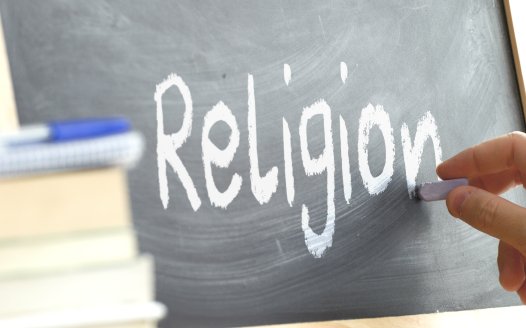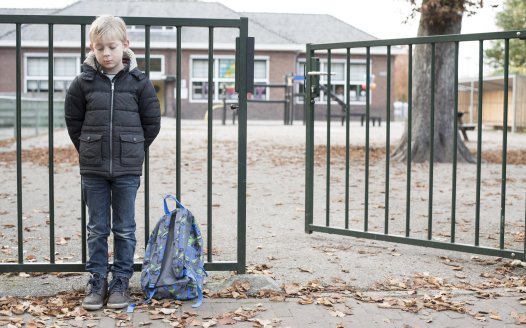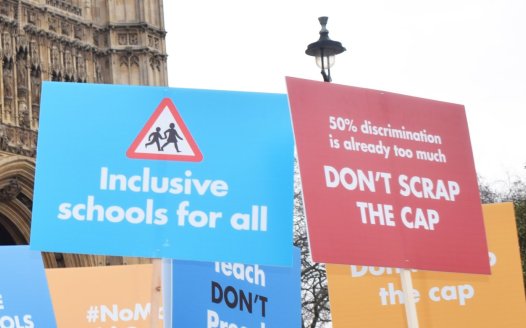The PM must be held to account for her faith school obsession
Posted: Thu, 20th Jul 2017 by Chris Sloggett
Theresa May's plans to expand faith schools in Britain are ill-judged. In response, Chris Sloggett argues, it is up to secularists to make a principled case: state education must be grounded in reason and free intellectual enquiry.
Books in the library promoting rape and violence against women. Girls complaining that they were being prevented from integrating into wider society. An apparent culture of discrimination against LGBT people.
Welcome to the Al-Hijrah school in Birmingham, where boys are separated from girls from the ages of nine to 16. Last week, during an eye-opening case at the High Court, we saw what can happen when a conservative Islamic ethos takes hold in a school.
Then this week Sir Nick Weller, the executive principal of a chain of academies in Bradford, said there was an "unhealthy" degree of segregation in the city. Two groups of people lived "separate lives". Their children were educated at different schools.
"Bradford is almost two communities: the Muslim community and the white community," he said.
So what better time could there be for Theresa May to utter this gem at Prime Minister's Questions: "It's important to enable more faith schools to be set up and to expand"?
The Government, she added, will publish its response to a consultation on the issue soon. All the indications suggest the rules on admissions will be relaxed. Faith schools will become even more exclusive than they already are.
According to the Bishop of East Anglia, Alan Hopes, this is a welcome trend. "More faith schools will mean more diversity and more inclusivity in schools," he said yesterday. But extending schools' right to admit children based on their parents' religious views, and push a religious agenda on them once they are there, is an odd way to promote inclusion.
"Diversity" was also the argument advanced by some proponents of faith schools on last night's Moral Maze on BBC Radio 4. But when he was pressed on what that meant, one speaker said schools should be able to teach that homosexuality is wrong. Another said he advises his children that sexual encounters should be "within the context of marriage".
We should trust children to hear a broad range of intellectual perspectives, but opinions like these do not have a special right to be protected. In secular schools they would be subject to the same exposure and testing as any other idea. If that means they are defeated, we should welcome it.
And when some state-funded schools teach that rape in marriage is "wrong" and others teach that "well, maybe it isn't," perhaps a lack of diversity is not the problem. A strong society must accept an element of difference – but it must also be guided by a clear set of principles.
Advocates of faith schools tend to have two other main fallbacks. First they say that parents should be allowed to choose the education they want for their children. It is unclear how many of those who make this argument would react positively if taxpayers' money was spent on atheist schools where children attended collective recitals of The God Delusion or watched Christopher Hitchens videos every day.
But more importantly faith schools prevent plenty of parents who want to send their children to inclusive community schools from doing so. Faith schools use up scarce resources, and in many local authorities this leaves insufficient places elsewhere.
Lastly the faith schools lobby says: look at the statistics. These schools produce good results in public exams and Ofsted inspections. There is no need to change them.
But is that surprising when some schools are given a special right to manipulate their intake? Do we expect parents who take advantage of the system to raise their children in the same way as those who do not? And do the metrics reflect the purpose of education?
A faith-based ethos does not make a school successful. Clear, reasonable expectations do. Strong partnerships between teachers and parents do. Leaders who value responsibility, community and personal development do.
The case against faith schools is strengthened by the fact the UK is no longer a religious country. There is overwhelming public opposition among people of all faiths and none to relaxing the cap on religious admissions. And yet the Prime Minister is hardly being held to account for her position.
Her remarks made no more than a brief appearance in the Catholic newspaper The Tablet. Last year Labour's shadow education secretary, Angela Rayner, made a passionate speech arguing against grammar schools, where segregation is based on ability. But she had nothing to say on dividing children on the far more nonsensical grounds of their parents' religious views. There was no mention of faith schools in Labour's general election manifesto.
So this is not simply a "Tory" problem. Both major parties seem to think it is too risky to take on faith groups and communities. Rolling back faith schools would be a step towards an education system which values everybody equally. But both the Conservatives and Labour are pandering to the interests of particular groups.
In these angry times, social cohesion is not in fashion on either side of the political spectrum. Identity politics is king. From the left comes the culturally relativist argument that minority communities need their own enclaves and rules, with the damaging implication that secular principles are no better than those held by religious fundamentalists. Translation: we must not touch Muslim schools, lest we be considered racist.
From the right we hear that British institutions are our defence against radical Islam. This means Christian faith schools should not have to pay the price for the sins of institutions such as Al-Hijrah. Perhaps we even need more of them, to assert 'our' own identity and give us strong moral guidance.
So on education, as on so many other issues, it is left to secularists to make the principled case based on universal values. Education should encourage a spirit of free intellectual enquiry. Children should be taught about ideas which have shaped the world, while also being given the chance to make their own minds up about existential questions. And young people should not be separated by their parents' religious leanings.
Chris Sloggett is the communications officer at the NSS and a former teacher. The views expressed in our blogs are those of the author and may not represent the views of the NSS.







